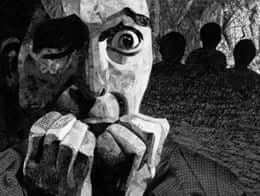Schizophrenia is a complex mental health condition, with symptoms often starting to show between the ages of 16 and 30 years old. There are a handful of subtypes of schizophrenia, each with a particular set of prominent symptoms that distinguishes them from one another. Paranoid schizophrenia also referred to as schizophrenia with paranoia, is a more commonly diagnosed subtype. Those struggling with the condition experience hallucinations and delusions that often leave them feeling fearful and mistrusting of others.
Symptoms
When looking at the characteristics of schizophrenia, there are symptoms referred to as “positive” and “negative” symptoms. The words positive and negative are not used here to suggest that certain symptoms are good or bad. Rather, positive symptoms refer to those that are often easily observable to others and that is in addition to your functioning, such as the experiences of delusions and hallucinations.
Negative symptoms refer to those symptoms that show a reduction of your functioning, such as not expressing much emotion and a loss of will to do things. These are symptoms that you would be lacking or losing with schizophrenia.
With paranoid schizophrenia, you experience the positive symptoms such as delusions and hallucinations.
Delusions
Someone with paranoid schizophrenia will experience a preoccupation with delusions. Delusions refer to something you believe that is not true. No matter how much information is presented to you showing that the belief is false or misperceived, you continue to hold on to the belief. There are many types of delusions, although the following are more common with those who experience paranoid schizophrenia:
- Ill health: Belief of having a terrible disease or condition
- Jealousy: Belief that a spouse or partner is being unfaithful
- Passivity: Belief of being controlled or manipulated by an outside influence
- Persecution: Belief of being interfered with or the center of a conspiracy
- Reference: Belief of being talked about by others, including the press
- Thought control: Belief that ideas are being put into your mind by others
Although delusions can be experienced in other subtypes of schizophrenia, the delusions specific to paranoid schizophrenia can leave you feeling like you are being judged, at risk of harm, unable to trust others, feeling alone in your experiences, and misunderstood by those around you.
Hallucinations
A hallucination is a false sensory perception and can affect any of the five senses. The types of hallucinations are referred to as:
- Auditory (sound)
- Visual (sight)
- Olfactory (smell)
- Tactile (touch)
- Gustatory (taste)
The senses that are often impacted by paranoid schizophrenia are sight and sound. In other words, you may see and hear things that are not present. It is important to note that hallucinations in paranoid schizophrenia are happening while the person is awake and conscious. Examples of auditory (sound) and visual (sight) hallucinations in paranoid schizophrenia may include things like:
- Hearing voices coming from an outside source, such as a speaker or other object
- Hearing voices commanding or conversing inside your mind
- Hearing abrupt sounds or music when there is nothing present
- Hearing sounds such as humming, whistling or laughing when no one is around
- Seeing faces and bodies
- Seeing images of a situation or event
If you’re dealing with paranoid schizophrenia, these hallucinations can feel unsettling and unwelcome, which can result in confusion and anxiety about where the hallucinations are coming from and if, or when, they will happen again.
Living With Paranoid Schizophrenia
Because the experience of delusions and hallucinations can be so intrusive, confusing and unsettling, you may find it difficult to let anyone know what you are experiencing. It can be challenging when you are left feeling scared, alone, and unable to trust others. If you feel unsafe, it can be a challenge to build or maintain relationships, keep employment, or engage in tasks of daily living. Interactions with others can feel threatening and attend social events can feel risky, which can lead people to paranoid schizophrenia to become reclusive in an effort to feel safe.
Schizophrenia treatment specialist, Dr. Lisa Cowley, shares that one of the greatest challenges in reaching out for help for those with paranoid schizophrenia is a lack of awareness or understanding of their condition. Cowley shares, “To these folks, their symptoms appear like they are really happening. So, if they feel like the government is spying on them through cameras in their home, they wouldn’t go see a psychiatrist or psychologist, they would try to contact authorities.”
As symptoms progress, someone with paranoid schizophrenia may become aware that they have an illness and seek help. As Dr. Cowley describes, “Challenges to treatment may become things like lack of transportation or problem-solving skills when their symptoms are high and their thinking isn’t as clear as it normally is. Usually, family members or support services, like social workers, can help with these issues.”
Treatment
Although there is no known cure for this condition, there are treatment options available that can help you live a full and productive life. Medications, particularly antipsychotics, can help calm disruptive delusions and hallucinations. Dr. Cowley suggests keeping in mind that your doctor may have you try a few different medications before finding a regimen that works best for you. She states that once the best medication regimen is determined, then things like individual therapy, group therapy, and other support services can be of help, depending on the resources available in your area.
Supporting a Loved One With Paranoid Schizophrenia
Dr. Cowley suggests that loved ones offering help and support to someone with paranoid schizophrenia read the book I am Not Sick, I Don’t Need Help!by Xavier Amador. She shares, “This book directly addresses how families can help, especially with people who don’t realize they are ill.” Cowley says to be supportive but set healthy limits for your loved one and to be patient, remembering that the stabilization process often takes time. Cowley emphasizes, “It’s also helpful for family members to get therapy or join support groups” to help work through some of the challenges that may come from supporting a loved one with paranoid schizophrenia







